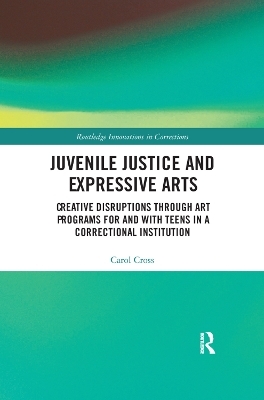
Juvenile Justice and Expressive Arts
Routledge (Verlag)
978-0-367-37504-1 (ISBN)
Juvenile Justice and Expressive Arts: Creative Disruptions through Art Programs for and with Teens in a Correctional Institution explores art programming as a sustainable educational initiative to support incarcerated teens’ successful reintegration to society. Responding to a lack of scholarly research on juvenile offenders and the role of art as education in correctional facilities, Carol Cross presents a qualitative study that examines critical pedagogy, adolescent development, and research into the governance and policies surrounding youth at a Canadian correctional facility. Through observational and interview data, action research, and visual analysis, the reader gains an insider's perspective into the lives of teens affected by crime and violence and the potential of art education to aid in increasing their self-esteem, social and emotional wellbeing, and personal development. Visual art and written stories created by male and female juvenile offenders are woven throughout the chapters to illustrate the use of creative expression as education and therapy.
Suitable for scholars and researchers in juvenile justice and corrections as well as policymakers and practitioners in the field, this book will provoke dialogue on best practices for the rehabilitation and reintegration of institutionalized children and youth.
Carol Cross, Ph.D., has professional experience working with diverse populations of homeless, mentally and physically challenged, and street-involved youth and adults in inner-city communities. She has also taught at the university level. Collaborative projects with various social service organizations adhere to her belief that integration between people of various life experiences and learning differences, ages, and ethnicities builds community spirit. A visual artist, Cross holds a Bachelor of Fine Arts from Emily Carr University of Art + Design, Vancouver, British Columbia. Her Master's in Education thesis focused on the social benefits of establishing sustainable community art programs, and art education as social intervention for "at-risk" youth. In her efforts to build positive social change and raise awareness of violence as a social problem, and with the support of Provincial and Government of Canada funding, she set up a free after-school photography and writing program for inner-city teens, held at a Vancouver college. In 2001, she founded Chroma Zone Studios, and in 2004, awarded a Government contract, she began working with incarcerated male and female teens at a correctional institution in British Columbia, Canada. Dr. Cross continues to advocate for social justice and community regeneration through her work as an artist and expressive arts educator.
1. Introduction to the Study. 2. Youth in Custody. 3. Art as Education and Therapy: Its Benefits for All Youth. 4. Methodology and Method. 5. The Projects. 6. Analysis and Discussion. Postscript. Appendices.
| Erscheinungsdatum | 16.07.2019 |
|---|---|
| Reihe/Serie | Innovations in Corrections |
| Zusatzinfo | 39 Halftones, black and white; 39 Illustrations, black and white |
| Verlagsort | London |
| Sprache | englisch |
| Maße | 152 x 229 mm |
| Gewicht | 370 g |
| Themenwelt | Kunst / Musik / Theater |
| Medizin / Pharmazie ► Medizinische Fachgebiete ► Psychiatrie / Psychotherapie | |
| Medizin / Pharmazie ► Physiotherapie / Ergotherapie ► Ergotherapie | |
| Recht / Steuern ► EU / Internationales Recht | |
| Recht / Steuern ► Strafrecht ► Besonderes Strafrecht | |
| Recht / Steuern ► Strafrecht ► Kriminologie | |
| ISBN-10 | 0-367-37504-4 / 0367375044 |
| ISBN-13 | 978-0-367-37504-1 / 9780367375041 |
| Zustand | Neuware |
| Haben Sie eine Frage zum Produkt? |
aus dem Bereich


